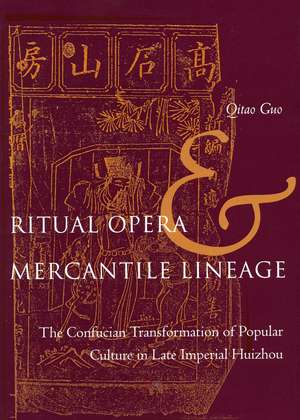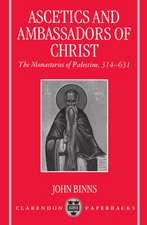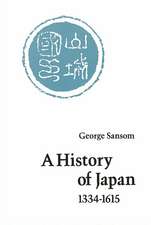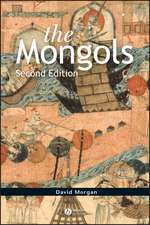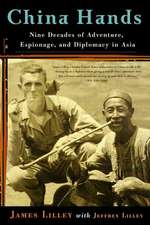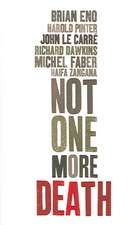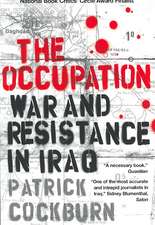Ritual Opera and Mercantile Lineage: The Confucian Transformation of Popular Culture in Late Imperial Huizhou
Autor Qitao Guoen Limba Engleză Hardback – 20 mar 2005
This book analyzes Confucian ideology as culture and culture as history by exploring the interplay between popular ritual performance of the opera Mulian and gentrified mercantile lineages in late imperial Huizhou. Mulian, originally a Buddhist tale featuring the monk Mulian's journey through the underworld to save his mother, underwent a Confucian transformation in the sixteenth century against a backdrop of vast socioeconomic, intellectual, cultural, and religious changes. The author shows how local elites appropriated the performance of Mulian, turning it into a powerful medium for conveying orthodox values and religious precepts and for negotiating local social and gender issues altered by the rising money economy. The sociocultural approach of this historical study lifts Mulian out of the exorcistic-dramatic-ethnographic milieu to which it is usually consigned. This new approach enables the author to develop an alternative interpretation of Chinese popular culture and the Confucian tradition, which in turn sheds significant new light upon the social history of late imperial China.
Preț: 566.58 lei
Preț vechi: 699.48 lei
-19% Nou
Puncte Express: 850
Preț estimativ în valută:
108.43€ • 117.74$ • 91.08£
108.43€ • 117.74$ • 91.08£
Carte tipărită la comandă
Livrare economică 23 aprilie-07 mai
Preluare comenzi: 021 569.72.76
Specificații
ISBN-13: 9780804750325
ISBN-10: 0804750327
Pagini: 384
Dimensiuni: 156 x 235 x 28 mm
Greutate: 0.67 kg
Ediția:1
Editura: Stanford University Press
Colecția Stanford University Press
ISBN-10: 0804750327
Pagini: 384
Dimensiuni: 156 x 235 x 28 mm
Greutate: 0.67 kg
Ediția:1
Editura: Stanford University Press
Colecția Stanford University Press
Recenzii
"Ritual Opera and Mercantile Lineage offers much worth reading and digesting. It is an important study, and it will certainly influence future generations of students."—Harvard Journal of Asiatic Studies
"With copious notes demonstrating extensive use of gazetteers, genealogies, local writings, and scripts, Guo's interdisciplinary excursion into the performing arts makes social history exciting to artists and historians, generalists and specialists alike"—History: Reviews of New Books
"Qitao Guo's most recent book is a fascinating study of the complex interplay between elite and popular and commercial and religious forces shaping the society of the Huizhou region in late imperial China..."—China Review International
"...scholars of drama and popular culture will be as amply rewarded by this study as the social historians."—Journal of Chinese Religions
Notă biografică
Qitao Guo is Associate Professor of History at the University of Hawaii at Manoa and the author of Exorcism and Money: The Symbolic World of the Five-Fury Spirits in Late Imperial China (Berkeley, 2003).
Textul de pe ultima copertă
“With copious notes demonstrating extensive use of gazetteers, genealogies, local writings, and scripts, Guo’s interdisciplinary excursion into the performing arts makes social history exciting to artists and historians, generalists and specialists alike”—History: Reviews of New Books
“Qitao Guo’s most recent book is a fascinating study of the complex interplay between elite and popular and commercial and religious forces shaping the society of the Huizhou region in late imperial China...”—China Review International
“Qitao Guo’s most recent book is a fascinating study of the complex interplay between elite and popular and commercial and religious forces shaping the society of the Huizhou region in late imperial China...”—China Review International
Descriere
Focusing on the Confucian transformation of Mulian opera, and especially on the interplay between the "civilizing" effect of ritual performance and the rise of gentrified mercantile lineages in sixteenth-century Huizhou prefecture, this book develops a radically novel interpretation of both Chinese popular culture and the Confucian tradition in late imperial China.
